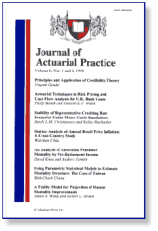Department of Finance

Journal of Actuarial Practice (1993–2006)
Date of this Version
1993
Document Type
Article
Citation
Journal of Actuarial Practice 1 (1993), pp. 49-66
Abstract
During the 1980s there was a trend in many countries away from defined benefit plans toward defined contribution plans. This development means that the individual member bears the full investment risk in the preretirement period and the annuity rate risk at retirement, as no pension benefit (expressed as a percentage of salary) is provided. This paper, through the use of a stochastic model for both inflation and a range of investment returns, analyses the distribution of retirement incomes that will be produced from a defined contribution plan. The impacts of changing entry and exit ages, different investment strategies, alternative career paths, and different economic assumptions also are assessed. The uncertainty of the resulting income benefits is highlighted, and the question is raised as to whether the individual member is aware of these results.
Included in
Accounting Commons, Business Administration, Management, and Operations Commons, Corporate Finance Commons, Finance and Financial Management Commons, Insurance Commons, Management Sciences and Quantitative Methods Commons


Comments
Copyright 1993 Absalom Press